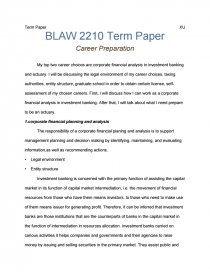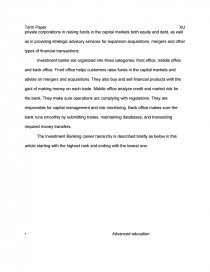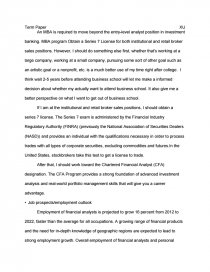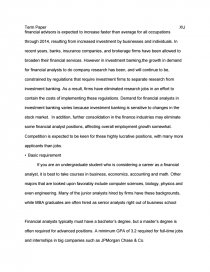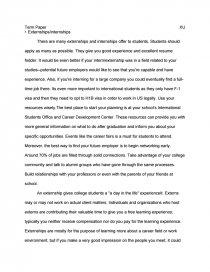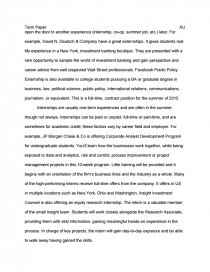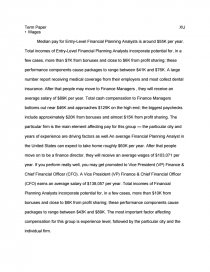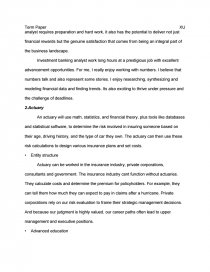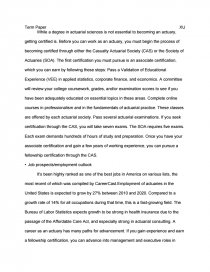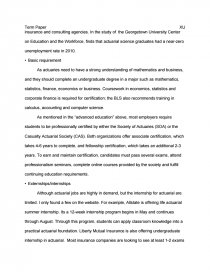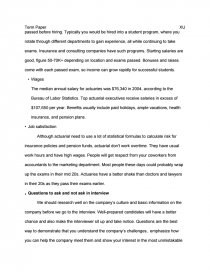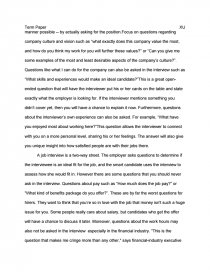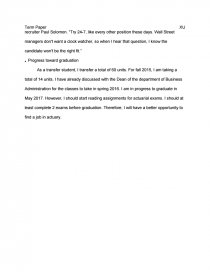Career Preparation
Essay by Jingru Xu • March 5, 2016 • Term Paper • 3,931 Words (16 Pages) • 1,117 Views
BLAW 2210 Term Paper
Career Preparation
My top two career choices are corporate financial analysis in investment banking and actuary. I will be discussing the legal environment of my career choices, taxing authorities, entity structure, graduate school in order to obtain certain license, self-assessment of my chosen careers. First, I will discuss how I can work as a corporate financial analysis in investment banking. After that, I will talk about what I need prepare to be an actuary.
1.corporate financial planning and analysis
The responsibility of a corporate financial planing and analysis is to support management planning and decision making by identifying, maintaining, and evaluating information,as well as recommending actions.
- Legal environment
- Entity structure
Investment banking is concerned with the primary function of assisting the capital market in its function of capital market intermediation, i.e. the movement of financial resources from those who have them means investors, to those who need to make use of them means issuer for generating profit. Therefore, it can be inferred that investment banks are those institutions that are the counterparts of banks in the capital market in the function of intermediation in resources allocation. Investment banks carried on carious activities it helps companies and governments and their agencies to raise money by issuing and selling securities in the primary market. They assist public and private corporations in raising funds in the capital markets both equity and debt, as well as in providing strategic advisory services for expansion acquisitions, mergers and other types of financial transactions.
Investment banks are organized into three categories: front office, middle office and back office. Front office helps customers raise funds in the capital markets and advise on mergers and acquisitions. They also buy and sell financial products with the gaol of making money on each trade. Middle office analyze credit and market risk for the bank. They make sure operations are complying with regulations. They are responsible for capital management and risk monitoring. Back office makes sure the bank runs smoothly by submitting trades, maintaining databases, and transacting required money transfers.
The Investment Banking career hierarchy is described briefly as below in this article starting with the highest rank and ending with the lowest one:
- [pic 1]Advanced education
An MBA is required to move beyond the entry-level analyst position in investment banking. MBA program Obtain a Series 7 License for both institutional and retail broker sales positions. However, I should do something else first, whether that's working at a large company, working at a small company, pursuing some sort of other goal such as an artistic goal or a nonprofit, etc. is a much better use of my time right after college. I think wait 2-5 years before attending business school will let me make a informed decision about whether my actually want to attend business school. It also give me a better perspective on what I want to get out of business school.
If I am at the institutional and retail broker sales positions, I should obtain a series 7 license. The Series 7 exam is administered by the Financial Industry Regulatory Authority (FINRA) (previously the National Association of Securities Dealers (NASD)) and provides an individual with the qualifications necessary in order to process trades with all types of corporate securities, excluding commodities and futures.In the United States, stockbrokers take this test to get a license to trade.
After that, I should work toward the Chartered Financial Analyst (CFA) designation. The CFA Program provides a strong foundation of advanced investment analysis and real-world portfolio management skills that will give you a career advantage.
- Job prospects/employment outlook
Employment of financial analysts is projected to grow 16 percent from 2012 to 2022, faster than the average for all occupations. A growing range of financial products and the need for in-depth knowledge of geographic regions are expected to lead to strong employment growth. Overall employment of financial analysts and personal financial advisors is expected to increase faster than average for all occupations through 2014, resulting from increased investment by businesses and individuals. In recent years, banks, insurance companies, and brokerage firms have been allowed to broaden their financial services. However in investment banking,the growth in demand for financial analysts to do company research has been, and will continue to be, constrained by regulations that require investment firms to separate research from investment banking. As a result, firms have eliminated research jobs in an effort to contain the costs of implementing these regulations. Demand for financial analysts in investment banking varies because investment banking is sensitive to changes in the stock market. In addition, further consolidation in the finance industries may eliminate some financial analyst positions, affecting overall employment growth somewhat. Competition is expected to be keen for these highly lucrative positions, with many more applicants than jobs.
- Basic requirement
If you are an undergraduate student who is considering a career as a financial analyst, it is best to take courses in business, economics, accounting and math. Other majors that are looked upon favorably include computer sciences, biology, physics and even engineering. Many of the junior analysts hired by firms have these backgrounds, while MBA graduates are often hired as senior analysts right out of business school
Financial analysts typically must have a bachelor’s degree, but a master’s degree is often required for advanced positions. A minimum GPA of 3.2 required for full-time jobs and internships in big companies such as JPMorgan Chase & Co.
- Externships/internships
There are many externships and internships offer to students. Students should apply as many as possible. They give you good experience and excellent resume fodder. It would be even better if your intern/externship was in a field related to your studies--potential future employers would like to see that you're capable and have experience. Also, if you're interning for a large company you could eventually find a full-time job there. Its even more important to international students as they only have F-1 visa and then they need to opt to H1B visa in order to work in US legally. Use your resources wisely.The best place to start your planning is at your school’s International Students Office and Career Development Center. These resources can provide you with more general information on what to do after graduation and inform you about your specific opportunities. Events like the career fairs is a must for students to attend. Moreover, the best way to find your future employer is to begin networking early. Around 70% of jobs are filled through solid connections. Take advantage of your college community and talk to alumni groups who have gone through the same processes. Build relationships with your professors or even with the parents of your friends at school.
...
...
